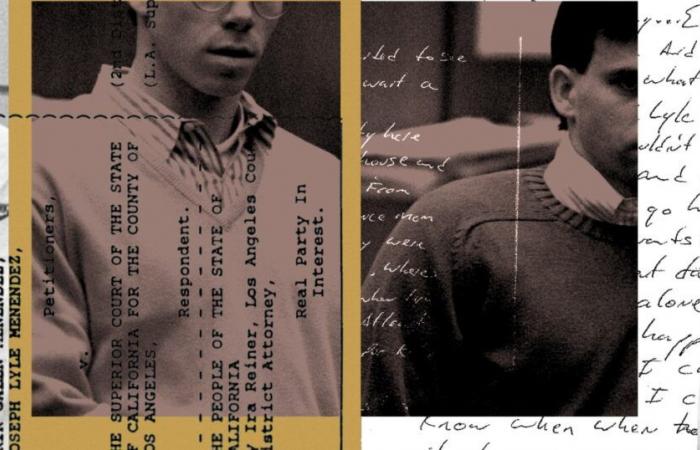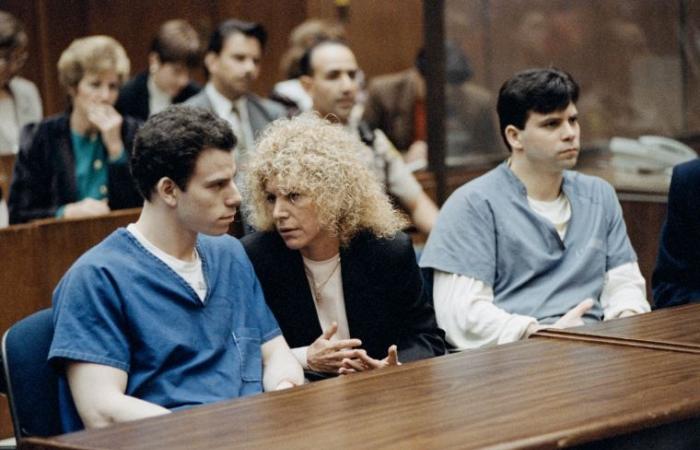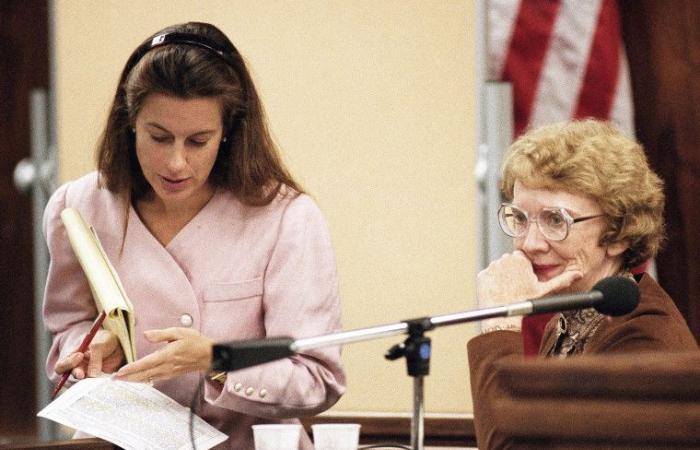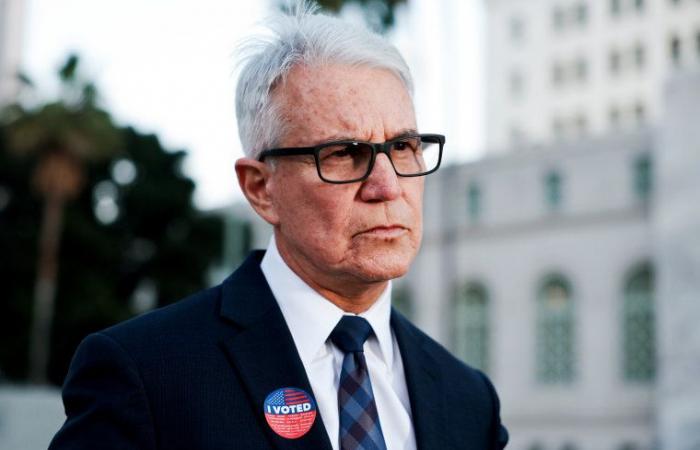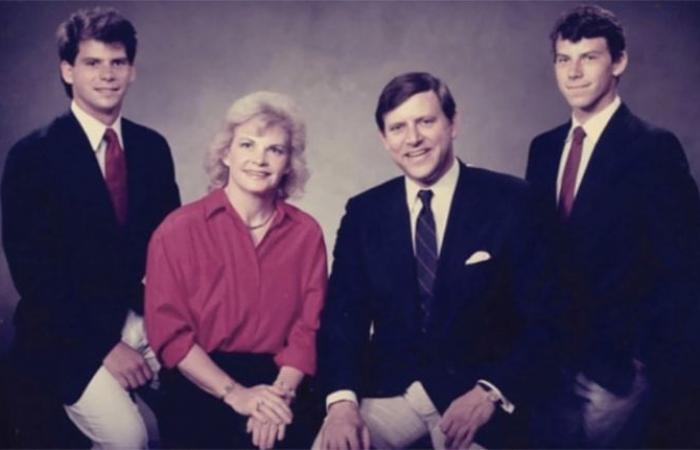While supporters and relatives of Erik and Lyle Menendez have advocated for their resentencing and possible release from prison, current and former prosecutors who tried the brothers in the 1990s told NBC News that they believe the men are cold-blooded killers and should remain where they are — behind bars.
In an exclusive interview, one of the prosecutors cast doubt on a new piece of potential evidence the brothers have presented in court to challenge their convictions.
“They killed their parents. They slaughtered their mother,” former Los Angeles County Deputy District Attorney Pamela Bozanich, who prosecuted the brothers in their first trial, told “Dateline.” “Why should they live among us?”
The brothers were sentenced to life in prison without the possibility of parole in the 1989 shotgun killings of their parents, Jose and Kitty Menendez, and have spent more than three decades in prison. But last month, Los Angeles County District Attorney George Gascón — who this week was voted out of office — told a judge that he supported resentencing the men to 50 years to life, which could make them eligible for parole immediately. Erik and Lyle Menendez no longer pose a public safety risk and have paid their debt to society, Gascón told reporters.
The announcement was applauded by those who pointed to the horrific abuse the siblings said they endured for years at the hands of their father, a wealthy entertainment company executive. Their supporters said it was time for the men to be free.
For Bozanich and another prosecutor who was involved in their second trial, it’s not that simple. Bozanich, who did not believe that José Menendez abused the brothers, said that even if their account is accepted as true, they were still convicted of gunning down their parents in cold blood.
Lyle, she said, shot their mom in the face at point-blank range after reloading his gun.
Juan Mejia, now a head deputy for the Los Angeles County District Attorney’s Office, raised another concern. He has doubts about a new piece of possible evidence in the case — a letter Erik said he wrote to his cousin about the alleged abuse decades ago — that one of their lawyers has described as the “linchpin” in a recent effort to challenge their convictions. Mejia, who has not previously spoken out about the matter, said that his views are his own and do not represent the district attorney’s office.
Mejia was a young deputy district attorney during the brothers’ second murder trial and later ran the division that reviewed the potential evidence — including the letter to the cousin — after it was filed in May 2023. He said the brothers have a history of fabrication, including Lyle’s alleged efforts to have people lie for the defense at trial, and he feared the brothers hadn’t changed in the manner described by Gascón.
“Are they trying to pull another fast one on the court?” Mejia said.
A lawyer for the brothers declined an interview request and did not respond to emailed requests for comment.
Prosecutors are expected to weigh in on the petition with a filing later this month.
Gascón told “Dateline” that he knew there was dissent in his office over the decision to support resentencing and said he will allow other prosecutors to argue their position for continued incarceration in court. He wrestled with the decision himself, he said, because there was no question the murders were brutal and premeditated.But Gascón said he believed the brothers’ account of abuse. And in the roughly 35 years they’ve been behind bars, he said, they’ve been “exceptional prisoners all the way around.”
A hearing for the brothers’ resentencing is scheduled for Dec. 11, a week after the county’s new top prosecutor is sworn in. A judge will determine if Gascón’s recommendation is appropriate.
Incoming Los Angeles County District Attorney Nathan Hochman said he plans on reviewing the facts, evidence and law before making a decision on the case. Multiple sources close to Hochman said Friday “there is a good chance” he will seek a delay in the resentencing hearing as he seeks to review facts and evidence in the case.
On the night of Aug. 20, 1989, Lyle, then 21, dialed 911 and — in a frantic-sounding call — reported that someone had killed his parents. The couple had been gunned down in the den of their Beverly Hills home.
The brothers initially told authorities that the killings may have been linked to their father’s “shady” business contacts, according to Les Zoeller, a former Beverly Hills detective who investigated the case. They named one of the founders of their father’s company who’d once been a pornography distributor, Zoeller told “Dateline.” But authorities investigated the tip and found nothing.
Zoeller became increasingly suspicious of the brothers’ extravagant spending after their parents’ deaths. They bought Rolex watches, houses, a Jeep and a Porsche, an appeals decision in the case shows. The detective also learned that one day after their parents’ deaths, the brothers had looked for their father’s will after he threatened to disinherit them, the detective said.
Eventually, investigators learned that Erik told a therapist that he and his brother killed their parents, Zoeller said. The brothers were arrested the following March and charged with first-degree murder.
Abuse allegations
When their televised trial began in 1993, the brothers testified and acknowledged killing their parents — but they said they’d done it after Lyle confronted his father about the alleged sexual abuse and threatened to expose him.
Lyle testified that he was molested until he was 8, while Erik said that the abuse was ongoing at the time of the killings.
After a confrontation, Lyle testified, their father appeared to threaten them. Days later, the brothers — believing they were in imminent danger — burst through the door with shotguns they’d bought in San Diego and opened fire, Lyle testified.Bozanich believed the claims of abuse were false. In the therapy sessions where the brothers revealed that they killed their parents, they never mentioned that it was because they’d been abused, Zoeller said. And although some of the brothers’ relatives testified that years before Erik and Lyle had indicated that their father was abusive, Bozanich said another relative told the prosecutor that she believed the brothers’ claims were fabricated.
“She confronted Lyle about it,” Bozanich said of the relative. “He said to her, ‘That’s the way it’s gonna be.’”

Bozanich alleged that the killings were motivated by money — and the possibility that the brothers could have been disinherited from the family’s multimillion dollar estate. While cross-examining Lyle, she also pointed to the cold-blooded nature of Kitty’s killing. After the brothers opened fire, Lyle testified, he ran out of ammunition. So he went to the car, reloaded and — upon returning to the den — saw his mother moving toward his brother, he said. Lyle put the shotgun to her cheek and pulled the trigger, Bozanich said.
A mistrial and then a conviction
After a six-month trial, jurors were unable to come to a unanimous decision on whether the brothers had killed their parents in self-defense — and should be convicted of the lesser crime of manslaughter — or if they were guilty of premeditated murder. A judge declared a mistrial.
In 1995, the brothers were tried a second time. In the first trial they had said the killings were an act of “imperfect self-defense,” but because of a recent ruling from the state’s high court, they were not allowed to claim that legal doctrine, according to the appeals decision. And Lyle did not testify.
That development came after authorities intercepted letters from Lyle that appeared to show him encouraging people to lie for the defense, Mejia said. In one instance, he asked a girlfriend to falsely claim she was sexually assaulted by Jose, while in another he asked a friend to claim he’d provided the brothers with a gun for protection, according to the appeals decision.
Erik and Lyle were convicted of first-degree murder and sentenced to life without parole.
Their legal saga has drawn renewed public attention in recent months after the debut of a Netflix miniseries and documentary about their lives.Making a case for release
In his interview with “Dateline,” Gascón said that the brothers have been model prisoners who have helped inmates with severe disabilities and taken college courses. They’ve established a green space “beautification” project at the prison where they’re incarcerated, he said, and there was no evidence they’d been violent toward other inmates.

When they committed their crimes, Gascón said, they were younger than 26. State and federal high court decisions have found that the part of the brain responsible for behavior control is not fully mature until a person’s mid- to late-20s, and California law states that with few exceptions, people who committed crimes under the age of 26 “are required to have a meaningful opportunity for parole during their natural life.”Now, Gascón said, the men are over 50 and married, meaning they’re less likely to reoffend and more likely to reintegrate into society safely.
Gascón acknowledged that the brothers’ crimes were brutal and premeditated, but said they were “poster cases” for a resentencing unit his office established three years ago that seeks to determine if an inmate’s prison term is no longer appropriate.
Gascón said that under the program, more than 300 people have been resentenced with a recidivism rate that is less than 1%. The decision to recommend resentencing for the Menendez brothers was “very straightforward,” he said.
A letter surfaces
Mejia agreed that the brothers likely meet the resentencing criteria. But he still opposes their release, he said.
One issue, Mejia said, was the letter included in the petition challenging the brothers’ convictions. The document is an undated photocopy of a handwritten letter that an attorney for the brothers, Mark Geragos, has said corroborates their father’s alleged abuse.
According to a declaration in the filing, Erik Menendez said he sent the letter to a cousin, Andy Cano, in December 1988, several months before the murders.

“I’ve been trying to avoid dad,” the letter says. “It’s still happening Andy but it’s worse for me now.”The document does not provide any details of the alleged abuse, but its author states that he is afraid of his father, who has warned him “a hundred times about telling anyone.”
After the petition was filed, Mejia said, prosecutors in the Los Angeles County District Attorney’s Office repeatedly requested the original letter from the brothers’ attorneys. But the lawyers never produced one, and the cousin it was addressed to died in 2003, Mejia said. In his view, the document’s reliability is in doubt.
“We can’t tell if it was written before the murders or after the conviction,” Mejia said.
Like Bozanich, Mejia said he remained troubled by the “gruesomeness” of the murders and how calculated they were. Maybe their mother knew about the alleged abuse and didn’t do anything about it, he added, “but there’s no justification for shooting your mom eight times with a shotgun and reloading.”

